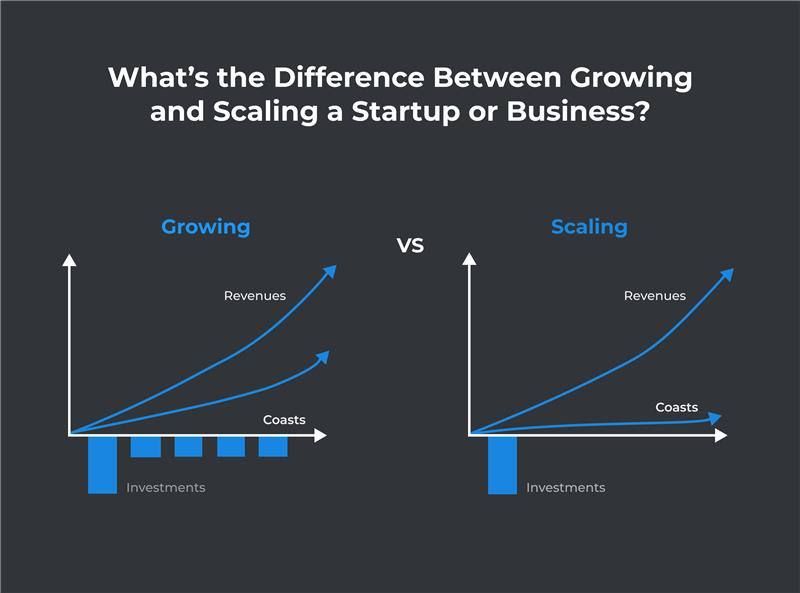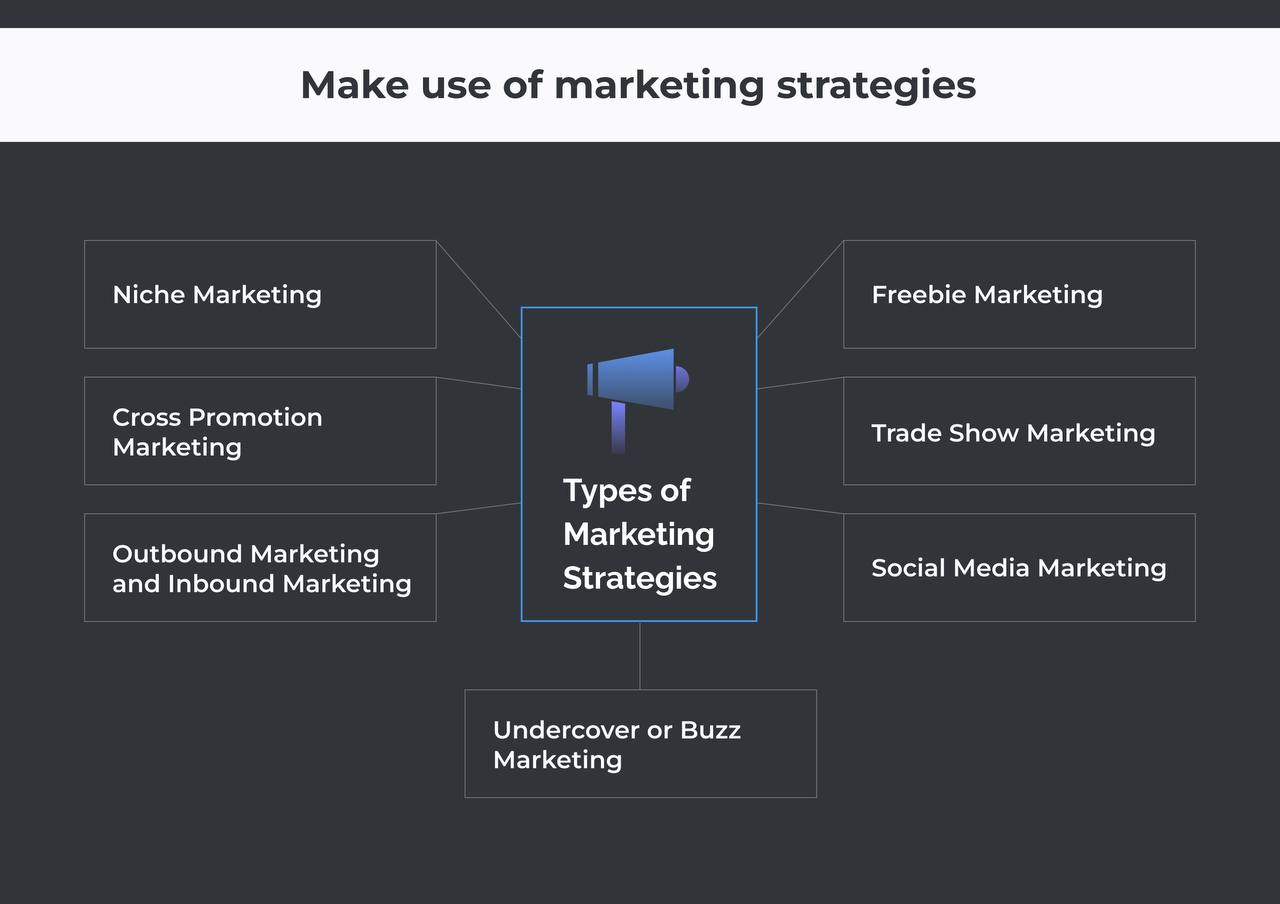Startup Scaling: Tips & Strategies

The path from startup to corporate titan necessitates significant work. Your firm has gone a long way since it started, and now it’s time to expand. However, scaling isn’t a simple process, and you will need an experienced partner to support you during this journey. Yojji has launched many startups successfully and assisted them in their expansion. In this post, we will help you determine if your firm is ready to scale up and provide some valuable advice on how to prepare your startup for scale.
What’s the Difference Between Growing and Scaling a Startup or Business?

It’s critical to understand the differences between scaling and growing. Growing implies that a company’s revenue and costs increase at roughly the same rate. For example, if you get more clients, you’ll need to recruit more personnel to serve them. Yet, when it comes to scaling, the scenario is entirely different. Scaling does not necessitate an increase in investment to provide exponential revenue growth. In layman’s terms, you obtain the most profit for the least amount.
When Is It High Time to Scale Up a Startup?
The right time for scaling is crucial. Care.com co-founder Donna Levin states that “Scaling prematurely burns cash, and it’s hard to course correct when you have hundreds of employees.” Therefore, make sure your organization is ready for it. Here are several criteria your company should meet.
You met previously specified objectives
It is the earliest and most visible indicator of startup scalability. In the early stages, business entrepreneurs lack sufficient knowledge to forecast their income, expenditures, and future goals. However, if they recognize that they have reached previously defined targets, it is time to reassess and scale up the firm.
Excellent teamwork
A solid team is vital for the accomplishment of your goals. Examine your staff carefully. Are they willing to provide new ideas for the project? Will they be able to take on new challenges? Some specialists work well now, but they could lose their effectiveness if additional tasks are added. Yet, for others, new projects will be an exciting challenge, increasing their productivity and creativity. If you are not sure that your team can handle everything, reconsider scaling.
A large customer base
A high number of clients and a substantial market share demonstrate the validity of the product or service proposition and give market stability to your organization. Revenue is another asset that clients bring to you. The more sales you have, the easier it will be to scale your project.
Sufficient cash flow
Positive cash flow shows that the firm is earning more money than it needs to support itself. As a result, you may be certain that you have additional funds to reinvest in the firm. Profit and cash flow may be confused by some business owners. While earnings might indicate that your company concept is valued and profitable, strong cash flow helps maintain your firm operations daily.

How to Prepare the Startup to Scale Up
Automate what you can
Automation allows you to scale your company operations while saving money. These are some examples of things you can automate:
- Chatbots
Various chatbots can be valuable in a variety of companies. They may assist in automating your customer care, teaching them how to use your product, and even making product or service recommendations to your consumers.
- Payments
Payroll and corporate payments should be automated.
- Martech
Martech aids in the automation of data collection, targeting client profiling, and analysis.
- Invoicing
Automated invoicing operations will help you steadily enhance the client experience while getting paid faster.
Invest heavily in technology
When your company evolves, be sure the technology and software solutions you employ are scalable enough to manage considerably greater loads, quick upgrades, and expanded capabilities. It would be far more cost and time effective to undertake a quick check-up before investing in developing your firm and taking on too many risks. Furthermore, we urge that you check to see if your systems are safe enough to prevent data leaking.
Secondary tasks should be outsourced
Large corporations frequently use in-house personnel. They employ their designers, software engineers, marketing specialists, writers, attorneys, and other professionals. But, there is no need for small businesses and startups to recruit in-house personnel for everything. An outsourced staff is the greatest option in this case.
Choose qualified employees
Expanding your startup entails recruiting additional employees. Make sure they meet the following requirements.
- They are multi-talented
In a startup, one individual may handle many duties. Prepare for this circumstance by hiring multi-skilled workers.
- They have creative minds
Innovative ideas are what set you apart in today’s increasingly competitive market. Fresh individuals with diverse backgrounds and experiences may be a breath of fresh air for your business. Hence, don’t be afraid to recruit innovative minds and then give them the freedom to discuss their thoughts.
Make use of marketing strategies

Since marketing is the primary challenge for new businesses, it is the only method to show your product and contact your target audience, which is critical for company success. There are several types of marketing techniques you can leverage.
- Direct marketing entails communicating with potential customers via text messages or email.
- When your firm has a popular blog or social media platform, content marketing is ideal.
- SEO optimization boosts the visibility of your website in search engine results and helps it to expand in visitors.
- Advertising is a paid campaign that helps your product expand and draws customers.
- Branding covers the design and characteristics that set you apart from your competitors.
- You may use social media to connect with people, publish news, and receive feedback on your product.
Tips for Scaling a Startup
- Become an authority in your field
Your consumers will respect you and seek you out if you can demonstrate that you are an expert in your industry.
- Discover the market
Consider your target audience’s demands as well as those of your rivals. You learn more about the actions you should take to succeed. You may, for instance, introduce services that your current clients do not provide or use exclusive offers to draw in new clients.
- Manage your finances
Keep your composure and make an effort to organize your costs as precisely as you can. And don’t overspend on things like extra features you’re unsure about or excessive recruiting.
Challenges When You Scale a Startup Business
You already know how difficult it is to run your own business. However, it doesn’t get much simpler when it’s time to scale. Your company is going through a critical period right now, and the dangers are much higher. Here are some typical problems to be on the lookout for when you scale your business.
- Hiring the right talents
It might be difficult to find and retain outstanding talent. Before beginning any preparations for expansion, you must have a capable and resilient staff in place.
- Not altering your business strategy to reflect shifting market conditions
You must continue to adjust to market developments as you scale your business. Profits will be lost, your firm will stagnate, and it will eventually fail if you don’t change your business practices.
- Not making smart use of capital
Get the highest possible return on your investment. You might ask any mentors in your network for advice to see if they have any success or failure stories. Forbes claims that mentored startups grow 3.5x faster and raise 7x more money.
How Do You Know the Scale is Successful?
The data speaks for itself. Only by studying the metrics can one determine whether scaling is successful or not. Metrics might be monitored annually, monthly, weekly, or daily. Average Revenue Per User (ARPU), Operational Efficiency (OE), Customer Acquisition Cost (CAC), and Customer Retention (CR) are the most popular success measures.
Yojji Experience
We have cooperated with various startups by helping them evolve. You can check our case-studies to learn more about our previous partnership. Here are some cases we would like to highlight.
Osu is a payment system for entrepreneurs with contemporary, straightforward, and attractive accounting software. Yojji has helped create this solution from scratch and worked on front-end web development and UI/UX design.
Payroll is a cloud-based solution for firms of any scale to manage payroll globally. During this collaboration, Yojji provided web development and product design services.
Bottom Line
Sometimes scaling may be difficult, dangerous, or even frightful. Yet sooner or later, this process will be experienced by your startup. Make sure you are prepared first and have a skilled team, a stable cash flow, the necessary budget, and modern technology. If you need professional assistance, you can contact Yojji, and our high-skilled experts will help you**.**
Looking to hire developers?



